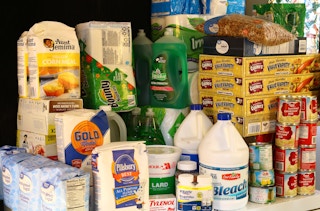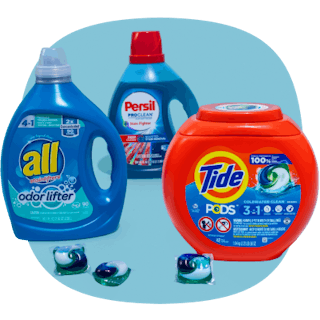We’re about to dive into a little murky moral area for us couponers … is it illegal to resell items you get from couponing? Whether you’re couponing just to cut your grocery bill, to stockpile, or to maybe make a little cash … the million-dollar question is how to resell your stockpile , the legal way.
Here at Krazy Coupon Lady, we don’t like it. We’ve never condoned it. It generally doesn’t make us feel comfortable, but when we sat down and examined it, we wanted to answer one question: Is selling your stockpile even legal?
The short answer to whether it is illegal to resell items is no.
(The “but” is coming … )
According to the Supreme Court, you are in fact allowed to resell items you purchased yourself.
In May 2017, Chief Justice John G. Roberts Jr. of the Supreme Court wrote that “The purchaser and all subsequent owners are free to use or resell the product just like any other item of personal property, without fear of an infringement lawsuit.”
That being said, there are still some serious risks.
And please hear us: it’s important to be courteous and place special orders in advance if you intend to buy in large quantities; clearing the shelves is just bad for everyone. Becoming buddies with your store managers is good for everyone.
Be sure to download the KCL app while you’re at it and set deal alerts for all the best deals.
1. You could be sued for selling expired products or products that have been stored in questionable locations.
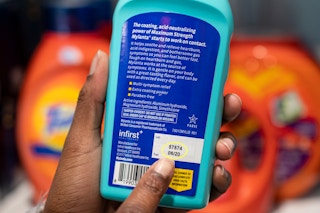
If you’ve been storing stockpiled items in locations with questionable conditions like your garage or storage shed, there’s a good chance that even your shelf-stable products have gone bad.
It’s all about liability. Just like grocery stores get investigated for safe-handling practices every time an E. coli outbreak happens with spinach they sell — you could get investigated (and sued) for the poor handling of any products you sell.
And even if you’re legally allowed to resell items from your stockpile, you understand the risks, and you’re 100% sure that your storage methods are safe, federal law says it’s illegal for consumers to resell items that have been recalled by the Consumer Product Safety Commission or by the manufacturer.
So always check the Food Safety Website.
If you must sell, try advertising your products by saying something like, “I am not aware of any issue with the product. The expiration date is: xx.”
Basically, if you warn folks or have them sign something mentioning any concerns regarding expiration dates , you widely lessen your liability. It never hurts to CYA.
2. You must report your profits to the IRS if you make over $600 per year selling your stockpile.

Do you really have to report your stockpile sales to the IRS?
YES. The end.
Selling anything on the side is a taxable way to earn money, but it’s not quite that simple.
Here’s what the IRS has to say about it:
“While most people are aware they must include wages, salaries, interest, dividends, tips and commissions as income on their tax returns, many don’t realize that they must also report most other income, such as:
-
Cash earned from side jobs
-
Barter exchanges of goods or services
-
Awards, prizes, contest winnings and gambling proceeds”
A total income of over $600.01 means you pay taxes, folks. Not reporting your income makes the IRS really crabby (and can get you fined or audited). No one wants that.
Here are the only exceptions:
-
If you don’t make any other kind of income, including all the listed sources above
-
If you are not married to someone who does make an income, and you file taxes jointly
Even if you only work part-time for yourself and full-time as a salaried employee somewhere else or you’re married filing jointly and your spouse works, the stockpile-selling part of your income qualifies as taxable income, and the IRS wants to know about it.
3. If you resell stockpile items, avoid using company trademarks or logos to market your product.
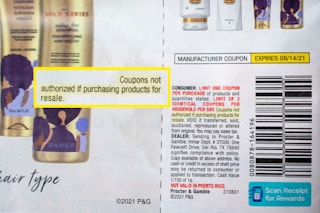
It’s illegal to use a company’s logo on your site or in the ad for your sale. Even anything close to it could get you in trouble.
When you resell stockpile items and use the company’s logo to advertise your sale, you risk getting sued for trademark infringement — especially if you make enough money that you don’t fly under the government’s radar.
Some manufacturing companies (P&G we’re looking at you) prohibit anyone from reselling their products, regardless of whether you used coupons or not. It’s in the small print on their coupons.
Now, P&G can’t legally stop you from reselling their products, but they can definitely contact you to take down your post on Facebook Marketplace or eBay if you’re misusing their logo. And remember how we said you could be reported to the IRS by literally anyone? Yeah, they can (and probably will) do that too.
Of course, you need to tell people the brand name so they know what they’re buying, and you legally can. So if you’re selling Tide , you can absolutely market your sale as “Tide detergent for sale: $X.XX.”
Just to cover all your bases, you should make sure you state in your sales advertising that those brand names or logos belong to their owner and not to you.
Related: P&G Coupon Insert in the Newspaper Ending January 2023
4. Donate your stockpile if you can make more money from the tax deduction.
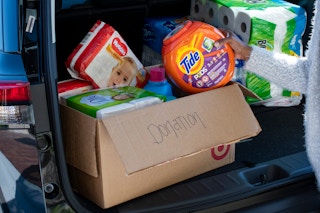
Donating rocks! Local food banks and charitable organizations will gladly take extra Tide off your hands.
Not only does it feel good, but you can also make some serious money by reporting the donations to the IRS as a tax deduction.
I have a friend who does this; when she’s thinking about having a garage sale, she looks up the tax deduction value for the items she wants to sell, then adds those deduction amounts up and compares it to what she would actually get for the items during a garage sale. This way she knows which method would turn the highest profit.
So how do you know what your items are worth? According to the IRS, you get to claim the retail value of the product (without coupons). This means if you bought laundry detergent for only $0.50 per bottle but it retails for $9.99 per bottle, you get to claim $9.99 as the value of the bottle you donate.
Here’s what you need to do:
-
Keep track of each item, including where you donated it.
-
Estimate how much each product or donation was worth.
-
Fill out Form 8283 when you file your taxes and attach it to your return.
TIP: TurboTax even has an app called It’sDeductable that lets you track your charitable donations throughout the year, making it so easy.
Download the KCL app to add and redeem coupons in store

